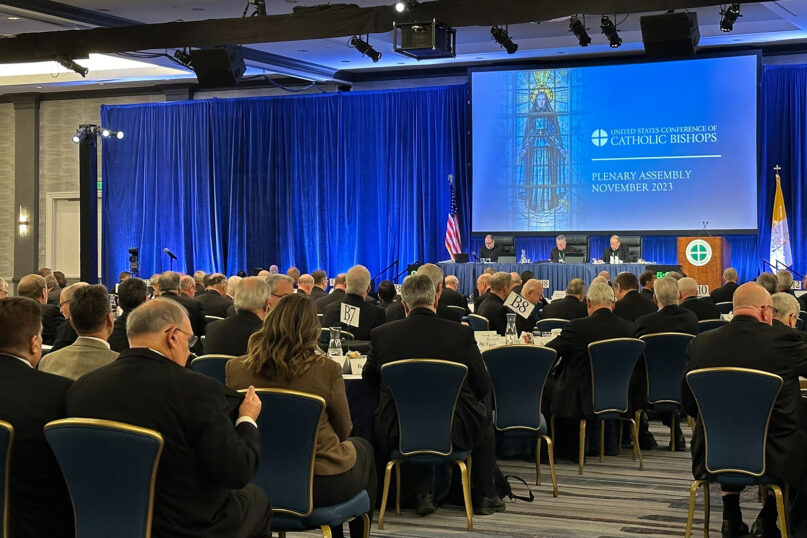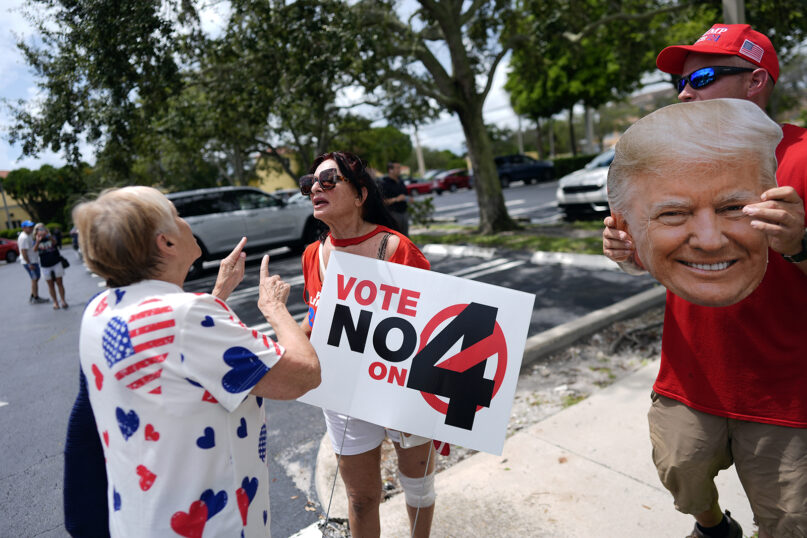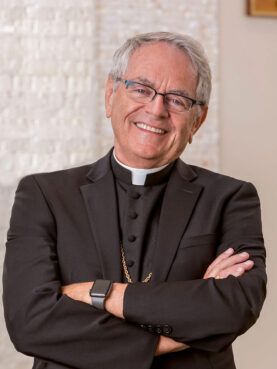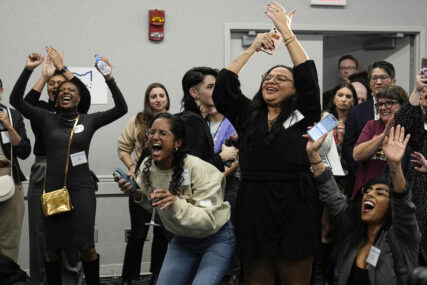(RNS and NPR) — Every Monday morning, Ashley Wilson makes a cup of coffee, opens her laptop and loads Florida’s campaign finance tracking website. As the spokesperson for abortion-rights group Catholics for Choice, she likes to keep an eye on donations to combat Amendment 4 — a ballot initiative that, if passed, would enshrine abortion rights in the state.
And every week, like clockwork, Wilson finds organizations tied to the Catholic hierarchy, long one of the loudest opponents of abortion rights, among the largest sources of donations dedicated to defeating Amendment 4.
“The most challenging part is the bishops are an incredibly well funded, well organized and powerful political machine,” Wilson said. “They are literally set up for success.”
But buried in the donation data are indications that Catholic bishops, at least when it comes to this year’s abortion fights, may be resigned to defeat. There are 10 states with abortion measures on the ballot in 2024 — almost all of them seeking to protect abortion rights. That’s four abortion measures more than in 2022, the first election after the Supreme Court overturned Roe v. Wade and returned the question of abortion to the states. Yet an NPR and RNS review of financial disclosures found that Catholic groups are contributing far less this year — if they’re spending money at all.
“We have not seen sort of those big money sums coming in yet,” Jamie Morris, executive director of the Missouri Catholic Conference, said in an interview.
In fact, if you add up the donations from bishops in all 10 states, it amounts to just over $1 million. That’s less than a third of the $3.68 million that a single Kansas archdiocese spent in 2022. But the Kansas bishops lost — voters rejected the measure that would have altered the state constitution to remove the right to an abortion. Bishops lost in Ohio, too, where they contributed $1.7 million to a political action committee set up to fight an abortion rights ballot measure, which ultimately passed. In all six states that had abortion ballot measures in 2022, voters sided with abortion rights.
Anti-abortion activists in 2024, Morris said, are operating with a “realistic view that up to this point, we have not been very successful as a pro-life community on these ballot initiatives.”
Most of the money Catholic bishops have spent this election has been in Florida, where they have donated nearly $1 million to groups fighting Amendment 4, making them one of the largest donors in that state. But so far, there is only evidence in public filings that dioceses have contributed in two of the other nine states: Colorado, where they’ve spent $50,000, and Missouri, where they’ve spent $30,006. The Missouri Catholic conference and its five dioceses — including the region surrounding St. Louis, where roughly 20% of the population is Catholic, according to the local archdiocese — have each donated $5,001 to Missouri Stands With Women, which is opposing the ballot measure.
In Arizona, where the race is expected to be tighter, bishops do not appear to have contributed any money to the anti-abortion PAC It Goes Too Far campaign, according to data from the secretary of state.
NPR and RNS also could not find evidence that bishops have spent any money this year on broader campaigns against abortion-related ballot initiatives in Montana, Nevada, Maryland, New York and South Dakota, nor have they spent money in Nebraska, where there are two competing abortion-related measures on the ballot.

FILE – Anti-abortion protesters gather for a news conference after Arizona abortion-rights supporters delivered more than 800,000 petition signatures to the state Capitol to get abortion rights on the November general election ballot, July 3, 2024, in Phoenix. (AP Photo/Ross D. Franklin, File)
The trend is even more dramatic when anti-abortion groups are compared with their opponents: In Florida, organized efforts to prevent a right to abortion have collectively raised around $9 million this year, whereas supporters of abortion rights have raised more than $90 million.
Catholic leaders and their allies said there is still time left for big influxes of cash, and noted the discrepancy could be explained by many extenuating factors. Jenny Kraska, executive director of the Maryland Catholic Conference, where a measure enshrining abortion rights is widely expected to pass, argued the sheer number of ballot initiatives this year could mean Catholic leaders are being more selective with where they spend their money.

The nation’s Catholic bishops gather for their annual fall meeting at the Marriott Waterfront hotel in Baltimore on Tuesday, Nov. 14, 2023. (AP Photo/Tiffany Stanley)
“Being realistic, when you look at what’s happened in other states that I think would be categorized as much more obviously red than Maryland … I think there also has to be the right allocation of resources,” Kraska said.
Wilson of Catholics for Choice also pointed out that many of the measures were only cleared by judges to appear on the ballot recently, making it difficult to muster campaigns on short notice.
Not that Catholic bishops and state Catholic conferences have given up. Many are allocating resources toward quieter, more targeted methods to convince voters — and worshippers in their own pews — to embrace their cause.
Prelates in several states fought against putting abortion initiatives on the ballot in the first place, and Catholic leaders in Nevada produced a video criticizing the state’s abortion initiative that has been shown in all Archdiocese of Las Vegas parishes. In Nebraska, the state’s Catholic conference has organized a website that includes downloadable prayer cards calling on God to “move the hearts and minds of all Nebraskans to vote against Initiative 439.”

A supporter of Democratic presidential nominee Vice President Kamala Harris, left, argues about abortion rights with supporters of Republican presidential nominee former President Donald Trump, protesting alongside an event kicking off a national “Reproductive Freedom Bus Tour” by the Harris-Walz campaign, Tuesday, Sept. 3, 2024, in Boynton Beach, Fla. (AP Photo/Rebecca Blackwell)
In Florida, local activists such as Maureen Shilkunas, who works for the Diocese of St. Augustine, are giving talks about Amendment 4 in churches, colleges and even garden parties. She wears a pin with footprints that symbolize a 10-week-old in utero, and uses it as a conversation starter wherever she goes.
“People say, ‘Oh my gosh, what is that?’ Then I ask them, ‘Have you heard about Amendment 4?’” Shilkunas said.
Archbishop George Leo Thomas of Las Vegas said he is also trying to coordinate a multifaith coalition to defeat the abortion measure in his state, appealing to evangelical Protestants and members of The Church of Jesus Christ of Latter-day Saints to form “a more expansive approach to the legislation.”

Archbishop George Leo Thomas. (Photo courtesy Archdiocese of Las Vegas)
“I’m pretty good at street fighting, so I have absolutely no problem whatsoever taking on complicated issues, but I just feel that it’s so important to have allies and partners in order to actually win the battle,” Thomas said.
What’s more, Catholic groups have backed last-minute legal efforts to remove the measures from the ballot, at least two of which involved the Thomas More Society, a Catholic legal group. Last month, the Missouri Catholic Conference sent out an action alert to supporters urging them to pray the rosary and fast in support of the Thomas More Society’s legal case against the measure as it went before the state Supreme Court. That case, as well as a similar effort supported by the Thomas More Society in Nebraska, failed.
But even as they strive to defeat the ballot initiatives, the messaging of anti-abortion Catholics this year focuses less on broad-based Catholic opposition to abortion and more on the specifics of each initiative. Instead of railing against abortion as a “moral evil” — the language of the Catechism of the Catholic Church — Catholic leaders in multiple states have been more apt to label local abortion rights legislation as “deceptive,” “vague” or “extreme.”
“Catholics, we would oppose it in any case, because we would oppose any expansion of abortion ‘wrongs’ — or abortion rights, as some people might frame them,” Miami Archbishop Thomas Gerard Wenski said in an interview. “But there is enough for pro-choice people to oppose here as well.”
Morris, of the Missouri Catholic Conference, acknowledged that for the “purposes of messaging,” his group is trying to reach Catholics who are not “completely with us 100% on the issue of abortion” by arguing that the state’s ballot initiative is a threat to the “safety of women.”
Polls have long shown broad support among Catholics for abortion rights, with 61% of Catholic respondents in a 2023 Pew survey saying they believe abortion should be legal in all or most cases. Dissent has even come from nuns: In 2022, two Catholic women religious defied bishops on the issue in Kansas, publishing a letter saying efforts to pass an abortion ban there would allow politicians to “impose religious beliefs on all Kansans.”
Archbishop Thomas of Vegas recognizes the uphill battle he and his brother bishops face this year, saying his own approach — building a multifaith coalition — “may or may not work,” but no matter what, “we’ll sure go down fighting.”
Rosemary Westwood is with NPR member station WWNO and Jack Jenkins with RNS.
This story was produced through a collaboration between NPR and RNS. Listen to the radio version of the story.
















